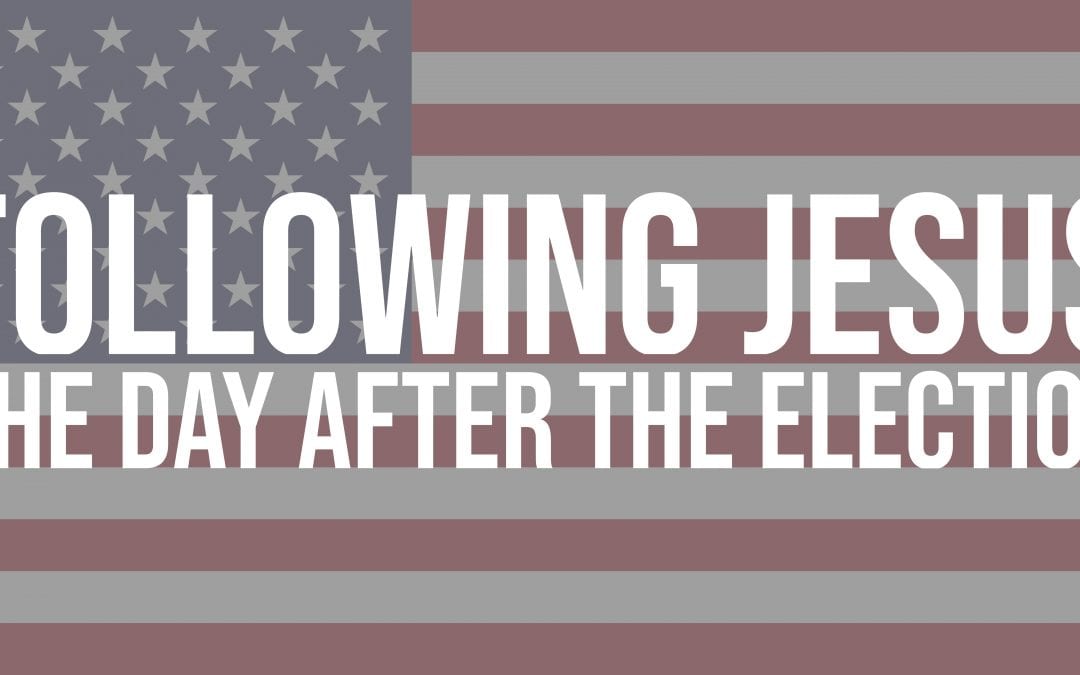As I sit here tonight watching the election results roll in, I find myself a bit unsettled. No, I’m not fretting about the results themselves. I’m more concerned about those I pastor, who I know come from diverse political backgrounds and worldviews. No doubt, some of them will be celebrating, while others will be dejected.
As a pastor, I try to make my political opinions abundantly clear. In fact, I can sum it up in three words: Jesus is Lord. Sure, that may come across to you as nothing more than theology-speak detached from the reality of our political moment, but I beg to differ. The Lordship of Jesus was a subversive political pronouncement in the 1st century, and the same is true of our day. To say Jesus is Lord was to say Caesar is not – meaning Jesus wasn’t just the Lord of my spiritual life, but my physical reality. In today’s terms, Jesus is Lord, and Donald Trump is not. Neither are any of the leaders we elect.
Ultimately Christians, no matter what nation they live in, owe their highest allegiance to the the Kingdom that Jesus inaugurated with his death and resurrection. Out of this allegiance, we form values and practices through his Kingdom – meaning we view our citizenship in America through this lens. What drives our voting, language, and activism in our political systems should be molded by the the framework of Jesus. When our political affiliation drives our spiritual reality, dangerous things happen – no matter what party we vote for.
With that being said, I know people in our church who I truly know love Jesus who have political leanings on both sides of the aisle. Some republican, some democrat, both processing their politics through their faith. None of them get it all right, because, well, none of us do. There will certainly be strong disagreements, but in Christ, we have unity in his Kingdom. That’s the miracle of the cross – the walls of hostility are torn down between us, as love reigns supreme over our differences.
So as the election passes, all of us have the responsibility to examine our hearts. If our party won, we must guard against pride. If our party lost, we must guard against despair. Both pride and despair reveal misplaced hope in our hearts towards American politics as a means to save us. But perhaps worse is the fact that both our pride and despair harbor the seed of disdain for our neighbors who vote differently than us.
Love, after all, is the marker of our discipleship to Jesus. Not just love for those who look, live, and vote like us. But love for those who look, live, and vote unlike us. Jesus makes this clear in the Sermon on the Mount:
“You have heard that it was said, Love your neighbor and hate your enemy. But I tell you, love your enemies and pray for those who persecute you, so that you may be children of your Father in heaven. For he causes his sun to rise on the evil and the good, and sends rain on the righteous and the unrighteous. For if you love those who love you, what reward will you have? Don’t even the tax collectors do the same (Matthew 5:43-48 CSB)?
Voting is central to our American citizenship. But loving our neighbors and loving our enemies is central in our Kingdom citizenship. The degree that we allow American politics to undermine our kingdom mandate to love is the degree that we lose sight of the heart of our faith. When we demonize and dehumanize those who vote and think differently, we cease looking like Jesus to the world around us. James reminds us of this clearly:
With the tongue we bless our Lord and Father, and with it we curse people who are made in God’s likeness. Blessing and cursing come out of the same mouth. My brothers and sisters, these things should not be this way (James 3:9-10 CSB).
So in the day after the election, let’s be diligent to examine our hearts and keep our Kingdom perspective clear. In the grand scheme of eternity, your love will outshine your vote. It’s why I’m thankful that on Sunday, democrats and republicans will share in the common meal of communion, receiving the bread and the cup in a unity only found in Jesus Christ. Together, we’re learning to love one another through our differences. I may not be able to meet you in every policy, but I can meet you at Jesus. And we’ll sort it all out from there – together.
the common meal of communion, receiving the bread and the cup in a unity only found in Jesus Christ. Together, we’re learning to love one another through our differences. I may not be able to meet you in every policy, but I can meet you at Jesus. And we’ll sort it all out from there – together.

